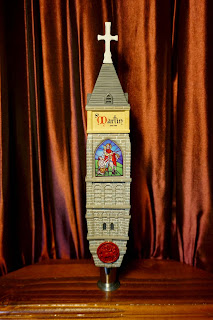Tap Handle #597: Brasserie de Brunehaut - St. Martin
Tap size: 10.5"
Rarity: 10 or less seen, import
Mounting: standard 3/8" ferrule on 5/16" anchor bolt
Rarity: 10 or less seen, import
Mounting: standard 3/8" ferrule on 5/16" anchor bolt
This beautiful tap may possibly be modeled after a real structure somewhere, or maybe it is modeled after old paintings or drawings of the destroyed Saint-Martin Abbey. Regardless, it is an amazing tap, with meticulous detail in the renditions of stone bricks, shingles, the cross on the top, and various windows. There is a label on all 4 sides with the name of the brewery and the words "Anno 1096", which in Italian means "Year 1096" and refers to the founding of the St. Martin Abbey. A decal on the front resembles a stained glass religious scene, and is so bright and colorful that it imparts the look of real stained glass exceptionally well. The front and back are identical to each other, as are the two sides to each other, so I have reduced the number of photos taken. The tap is not variety-specific and is used for all varieties that are imported to the U.S. (I have chosen to profile their highly-regarded Triple). It is also very scarce, most likely due to its import status, as I have only seen two others, and they were fairly expensive.
Click through to read more about Brasserie de Brunehaut, their St. Martin beers, and to see more photos of this iconic tap...
Brasserie de Brunehaut was originally founded as the St. Joseph Brewery in Guignies, Belgium in 1890 by the Allard family. Their St. Martin line of beers can be traced back to the historic Abbeye de Saint-Martin, founded in 1096 in Tournai. That year was a time of severe medieval famine, locally remembered as part of "the great plague". Beer was already known as a safer alternative to local water supplies suffering from impurities. To promote public health, and compensate for minimal humanitarian support from far-away Rome, Benedictine Bishop Radbod included brewing permissions in the charter to re-establish Abbaye de Saint-Martin. Brewing thrived at Abbaye de Saint-Martin, through multiple wars and rebellions without significant interruption until 1793 when, during the French revolution, most abbey structures, including the church sanctuary and brewery, were destroyed. Fortunately, many important abbey documents, including Saint-Martin's "secret" brewing recipes, were successfully hidden from revolutionary plunder.
In 1890, Brasserie de Brunehaut started to brew the abbey beers based on the recipes compiled by the monks. More than forty individual Brunehaut beers were brewed during the next century and the brewery became known for the quality of their beers in the region. The brewery historically maintained approximately two dozen labels, including several specialty and occasional seasonal beers. In 1990, output capacity doubled thanks to the construction of a newly-built fermentation house. In 1991, the brewery invested in new technology and equipment to improve the quality of their beers, which were well received by Belgian beer enthusiasts. The brewery’s fortunes had waxed and waned over the years, but unfortunately, fluctuating financial circumstances caused the brewery to close in 2005. A short time after, a brewing equipment salesperson by the name of Marc-Antoine de Mees heard that the brewery was for sale; he knew that this was the opportunity of his life to make a new and exciting impact in the brewing world, and set about turning around the brewery’s reputation and fortunes. When he purchased Brasserie de Brunehaut, he began to develop beers that caught the eye (and taste buds) of Belgian beer consumers.
Since de Mees took over Brunehaut, he turned an old brewery with a mixed reputation into a dynamic operation putting out award-winning beers with unique selling points. The Brunehaut line of beers is organic with three of them being gluten-free, and de Mees also works with a local family farm, Domaine De Graux, to produce the organic grain he uses in the Brunehaut beer line. As the farm gets more of its land certified organic, de Mees plans to expand the organic title to his other lines as well. While keeping the ancient brewing traditions and meshing them with modern technologies, de Mees’s beers have won several awards, and are available in 25 different countries. The brewery has 3 lines of beers - Brunehaut, the L’Alsacienne regional series, and the St. Martin lineup, which consists of 4 varieties and is the only one of the three lineups exported to the U.S. Combining top (in-bottle) fermentation with modern production technologies, their signature beers include Dubble and Tripel bottle-conditioned ales, consistent with 1000+ year-old Belgian brewing traditions.
Brasserie de Brunehaut's St Martin Abbey Triple is a Belgian Trippel style ale with a gold color and a strong, fine foam edge that stays well. The first nose is marked by candied fruit and a touch of acacia honey and supported by the fermentation to prevent it from being excessively sugary. The taste is supple, round and full of flavor. It is a gourmet beer for tasting rather than quenching thirst. Recommended food pairings are Herve cheeses briefly prepared in the oven with some Liege syrup (apple and pear syrup). The beer has been recognized at the International Recognition Awards in 2011, the Australian International Awards in 2009, and won a gold medal at the 2011 World Beer Championships.
Ratebeer weighted average: 82 out of 100
Beer Advocate: 83 out of 100 (good)
Brasserie de Brunehaut
Rue des Pannieres 17
Rongy, Belgium 7623
Source Material













Comments
Post a Comment